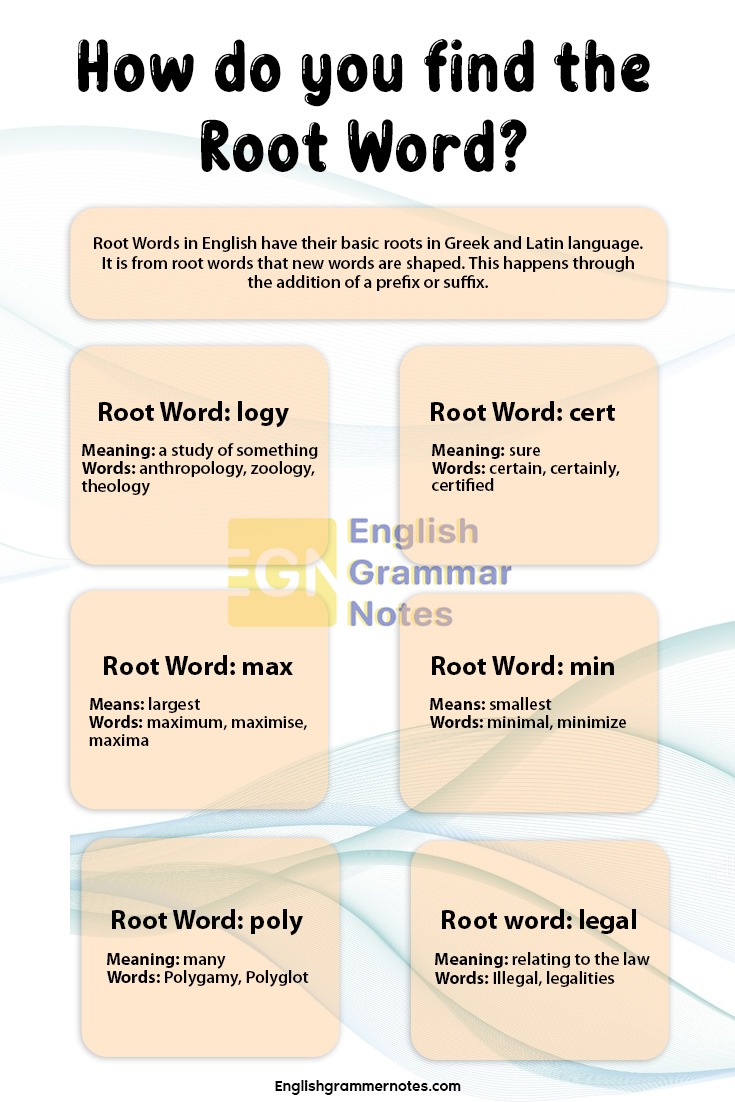You might have often wondered how certain small words occasionally appear in a lot of bigger words. The smaller words from which new words are formed are known as roots. In English Grammar, a root refers to a word or word element from which other words are formed, usually by adding prefixes and suffixes. Roots are also known by the name root words.
Root Words in English have their basic roots in Greek and Latin language. It is from root words that new words are shaped. This happens through the addition of a prefix or suffix. So what are prefixes and suffixes?
- Prefix: Refers to an affix that is added before the root word
- Suffix: Refers to an affix added after the root word.
Affix refers to a string of letters that is added at the start or end of a word. Now let’s see how root words work in English. Have you ever heard of the word ‘Archy’ which means rule? The root word ‘archy’ forms new words with the addition of suffixes and prefixes. Examples include:
- Anarchy which means a complete absence of rule
- Monarchy refers to the rule of a sole authority or person.
- Patriarchy: a kind of society governed by male rules and laws
- Hierarchy: Body of rules ranked in a certain order
- Matriarchy: a form of society where females are the head of the family.
From the above example, it’s pretty clear that English root words can be a powerful method to learn multiple English Vocabulary Words at the same time.
- Root Words List with Meaning and Examples
- How to Use Root Words to Form New Words?
- Why Learn Root Words?
- Are Root Words and Base Words the Same?
- Are Root Words Always Simple?
- What are some of the common root words?
- Do all words have roots?
- What are prefixes and suffixes?
Root Words List with Meaning and Examples
1. Root Word: logy
Meaning: a study of something
Words: anthropology, zoology, theology
2. Root Word: cert
Meaning: sure
Words: certain, certainly, certified
3. Root Word: max
Means largest
Words: maximum, maximise, maxima
4. Root Word: min
Means smallest
Words: minimal, minimize
5. Root Word: poly
Meaning: many
Words: Polygamy, Polyglot
6. Root word: legal
Meaning: relating to the law
Words: Illegal, legalities

7. Root word: meter
Meaning: measure or quantity
Words: millimeter, thermometer, kilometers
8. Root word: norm
Meaning: typical or standard
Words: abnormal, normal, normality
9. Root word: phobia
Meaning: fear
Words: claustrophobia, hydrophobia
10. Root word: act
Meaning: To move or do
Words: acting, enacting
How to Use Root Words to Form New Words?
Now that you are already familiar with root words, let’s take a look at how root words combine with prefixes and suffixes to form new words.
Take a look at the root word “Act”. You can create a new word by adding the element “reen.” “Reen” is used as a prefix, a component placed in front of a root word thereby changing its meaning. Prefixes at times can create new words that belong to a different class. So, from the noun “act,” we form the verb, “to reenact,” which means to act or perform something a second time.
You can add elements to the end of a root word. For instance, take the word “acting.” The suffix “ing” changes the noun “act” into an adjective. Suffixes are placed after the root word i.e. at the last. Prefixes and suffixes are altogether known as affixes.
Also, read:
Why Learn Root Words?
Does understanding of root words matter? Absolutely yes! Given below are some of the benefits of knowing root words:
Root words help you identify the meaning of a bigger, multisyllabic word by breaking it down into smaller units. Example: The word “Disrespectfully” can be broken down to dis-respect-ful-ly. This means something like “not-respect-full-of + adverb,”. This understanding serves as a great starting point for analyzing the meaning.
When you can identify a root word, prefix and suffix, you will be better equipped to build new words and expand your vocabulary. For example: “port” is a root word that means “to carry” or “to move”. Many new words are formed by adding prefixes and suffixes to the root word. Such words include transport, portable, teleportation, deport or export etc.
Expanding your vocabulary in turn helps you develop your comprehension, reading and writing skills. Root words, particularly those from other languages, help you learn about how a language evolved, how it is connected to other languages, and what important historical impacts resulted in its changes.
Are Root Words and Base Words the Same?
Base words are identical to root words, but they are not the same. A base word can be considered a standalone English word. A base word can also form other words by using prefixes and suffixes. However, root words cannot always be used as independent words.
- For example, the word breaking consists of the word break and the suffix ‘ing’. Here the root word stands for an independent entity.
- On the other hand, the word reject is made up of the prefix ‘re’ and the Latin root ‘ject’, which is not a stand-alone word.
Are Root Words Always Simple?
Most of the root words have a meaning of their own. That meaning conforms to the new word made from it. However, be cautious as this is not always the case. Some root word varieties make less sense.
- For example, take the word “apology.”
The root word “logos” suggests “speech” or “reason*
Prefix “apo” implies “away from.”
If you were to infer the meaning of apology based on root words alone, you might get the impression that it means “away from speech.” However, that is not a very apt description for a word that expresses regret or remorse. Hence understanding the meaning of the roots never ensures that you always have the most appropriate or clear definition.
FAQs on Root Words
1) What are some of the common root words?
A root word refers to a word or word element from which other words are formed, usually by adding prefixes and suffixes. Some of the common root words include act, friend, semi, max, min etc.
2) Do all words have roots?
In most cases, a word will have at least one root. It is from the root word that new words are coined. However, words can also be made up of more than one root. Example: geology- the root words are geo and logy.
3) What are prefixes and suffixes?
A root refers to a word or word element from which other words are formed, usually by adding prefixes and suffixes. Prefix refers to a word that is added before the root word.
Example: befriend- root word- friend and prefix added is “be”
On the other hand, suffixes are added after the root word. Example: friendly- root word- friend and suffix- “ly”.
Conclusion
Mastering the concept of root words can be helpful to you in numerous ways. If you take some time to learn root words and the most common affixes, you’ll enhance your vocabulary more than you can imagine. Learning root words will help you create new words by the addition of affixes.
You can also deconstruct a bigger word to learn its meaning if you are well versed in root words. On the whole, root words serve as an important lesson that helps you understand how words are formed. Check out our articles on How to Improve your Vocabulary and never struggle while speaking the language in search of words.
